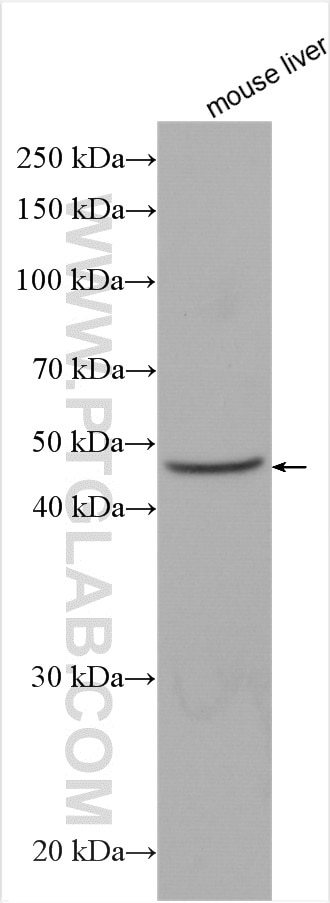SMPD2 Polyklonaler Antikörper
SMPD2 Polyklonal Antikörper für WB, ELISA
Wirt / Isotyp
Kaninchen / IgG
Getestete Reaktivität
human, Maus
Anwendung
WB, ELISA
Konjugation
Unkonjugiert
Kat-Nr. : 15239-1-AP
Synonyme
Galerie der Validierungsdaten
Geprüfte Anwendungen
| Erfolgreiche Detektion in WB | Mauslebergewebe |
Empfohlene Verdünnung
| Anwendung | Verdünnung |
|---|---|
| Western Blot (WB) | WB : 1:500-1:1000 |
| It is recommended that this reagent should be titrated in each testing system to obtain optimal results. | |
| Sample-dependent, check data in validation data gallery | |
Produktinformation
15239-1-AP bindet in WB, ELISA SMPD2 und zeigt Reaktivität mit human, Maus
| Getestete Reaktivität | human, Maus |
| Wirt / Isotyp | Kaninchen / IgG |
| Klonalität | Polyklonal |
| Typ | Antikörper |
| Immunogen | SMPD2 fusion protein Ag7367 |
| Vollständiger Name | sphingomyelin phosphodiesterase 2, neutral membrane (neutral sphingomyelinase) |
| Berechnetes Molekulargewicht | 48 kDa |
| Beobachtetes Molekulargewicht | 48 kDa |
| GenBank-Zugangsnummer | BC000038 |
| Gene symbol | SMPD2 |
| Gene ID (NCBI) | 6610 |
| Konjugation | Unkonjugiert |
| Form | Liquid |
| Reinigungsmethode | Antigen-Affinitätsreinigung |
| Lagerungspuffer | PBS mit 0.02% Natriumazid und 50% Glycerin pH 7.3. |
| Lagerungsbedingungen | Bei -20°C lagern. Nach dem Versand ein Jahr lang stabil Aliquotieren ist bei -20oC Lagerung nicht notwendig. 20ul Größen enthalten 0,1% BSA. |
Hintergrundinformationen
SMPD2, Sphingomyelin phosphodiesterase 2, is also named as Lyso-platelet-activating factor-phospholipase C and neutral sphingomyelinase (nSMase). It is involved in the sphingolipid metabolism pathway, which can catalyze the hydrolysis of sphingomyelin to form ceramide and phosphocholine. Smpd2/Smpd3 double-mutant mice were found to have severe retardation of late embryonic and postnatal growth and delayed puberty, belonging to hypothalamus-induced combined pituitary hormone deficiency (PubMed: 15764706).
Protokolle
| Produktspezifische Protokolle | |
|---|---|
| WB protocol for SMPD2 antibody 15239-1-AP | Protokoll herunterladen |
| Standard-Protokolle | |
|---|---|
| Klicken Sie hier, um unsere Standardprotokolle anzuzeigen |


